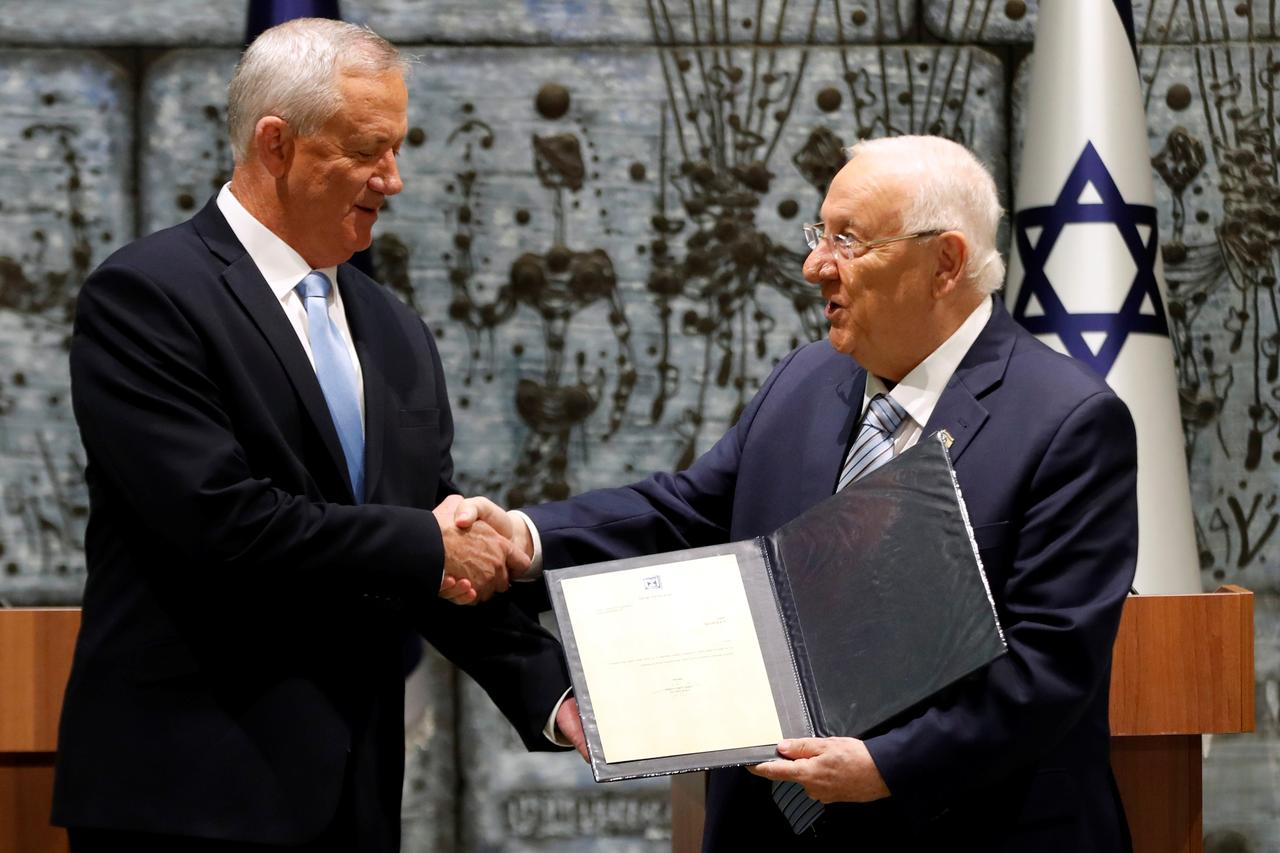
Israeli Prime Minister Benjamin Netanyahu reached a historic deal on Monday with one-time rival parliament speaker Benny Gantz to form an emergency unity government, ending the country's worst-ever political crisis.
The three-year agreement will allow Netanyahu, Israel's longest-serving premier, to stay in office for 18 months as he stands trial over corruption charges. He has denied wrongdoing.
Gantz will then take over as premier for another 18 months before Israel heads to a new round of elections.
Netanyahu, head of the right-wing Likud party, had squared off against Gantz in three inconclusive elections over the past year, but neither had secured enough support to form a viable governing coalition.
As the COVID-19 epidemic intensified following the last election on March 2, calls mounted for them to unite and offer the country a rare period of political calm as it battles an unprecedented health crisis.
"I promised the State of Israel a national emergency government that will act to save the lives and livelihoods of Israeli citizens," Netanyahu tweeted shortly after the deal was announced.
Gantz stressed that the deal had prevented "a fourth election." "We'll fight coronavirus and we will take care of Israeli citizens," he tweeted.
The deal reportedly includes an agreement to move towards annexation of Jewish settlements and other territory in the occupied West Bank, actions that would defy international law.
Extending Israeli sovereignty over those areas had been approved in U.S. President Donald Trump's controversial Middle East peace plan, condemned by the Palestinians and much of the international community.
After Monday's announcement, the Palestinians condemned the formation of a new Israeli "annexation" government, saying the agreement would wreck hopes of peace.
"The formation of an Israeli annexation government means ending the two-state solution and the dismantling of the rights of the people of Palestine," Palestinian Prime Minister Mohammed Shtayyeh tweeted.

Israeli Health Ministry inspectors speak with a woman who is in self-quarantine as a precaution against coronavirus, Hadera, Israel, March 16, 2020. /Reuters
Israeli Health Ministry inspectors speak with a woman who is in self-quarantine as a precaution against coronavirus, Hadera, Israel, March 16, 2020. /Reuters
Netanyahu: A master political survivor
Netanyahu is also the first premier in Israeli history to be indicted while in office, hit by corruption charges that threaten to end his political career.
The 70-year-old has spent several years fending off corruption accusations.
But he was ultimately charged with bribery, fraud and breach of trust over allegations that he received improper gifts and offered a media mogul profitable regulatory changes in exchange for positive coverage. He denies the allegations.
His corruption trial has been delayed for at least two months as part of a series of stringent measures taken by the Jewish state to control the coronavirus pandemic.
Netanyahu prefers the title "Mr. Security" and has stayed in power with a mix of divisive populism and the image of a world statesman close to foreign leaders, including Russian President Vladimir Putin – but especially the U.S. president.
Netanyahu was standing next to Trump at the White House when he unveiled his controversial Middle East peace plan in late January.
The premier said the proposal – widely seen as heavily skewed towards Israel – was earned in part through his personal bond with Trump and claimed it could only be implemented if he was re-elected.

Israeli President Reuven Rivlin gives Benny Gantz, leader of Blue and White party, a file during a nomination ceremony at the president's residency in Jerusalem, October 23, 2019. /Reuters
Israeli President Reuven Rivlin gives Benny Gantz, leader of Blue and White party, a file during a nomination ceremony at the president's residency in Jerusalem, October 23, 2019. /Reuters
Gantz: Israeli ex-general, pragmatist
Gantz, Israel's former armed forces chief, is widely seen as defined more by pragmatism and opposition to the right-wing premier than concrete policies.
The 60-year-old has been in the public eye since first declaring political ambitions and running for office in December 2018.
Within months, his centrist Blue and White party shocked Israeli politics by matching Netanyahu's right-wing Likud in polls last April and then edging slightly ahead of it in September.
But neither party was able to gain the support of more than half the 120 MPs in the country's proportional system, forcing yet another election on March 2, the third within less than a year.
After the vote, anti-Netanyahu forces, despite their deep divisions, unanimously rallied behind Gantz and recommended him to form a government.
But when the anti-Netanyahu camp forced the ouster of parliament speaker Yuli Edelstein last month, Gantz put himself forward as a replacement in a surprise move and was elected speaker on March 26.
In his first remarks after that election, Gantz called for an emergency unity government, saying "these are unusual times and they call for unusual decisions."
Monday's deal will allow Netanyahu to stay in office for 18 months, with Gantz taking over for another 18 months before new elections.
(With input from AFP)
(Cover: A banner depicts Benny Gantz, leader of Blue and White party, and Israeli Prime Minister Benjamin Netanyahu, as part of Blue and White party's campaign ahead of the upcoming election, Tel Aviv, Israel, February 17, 2020. /Reuters)